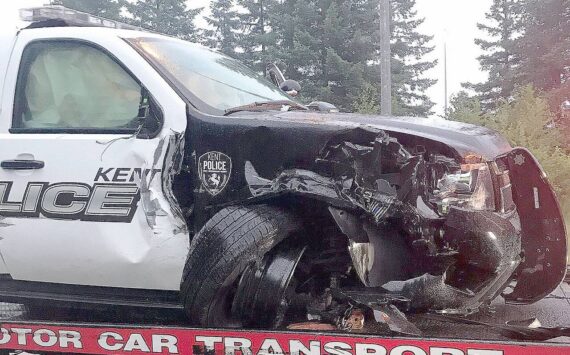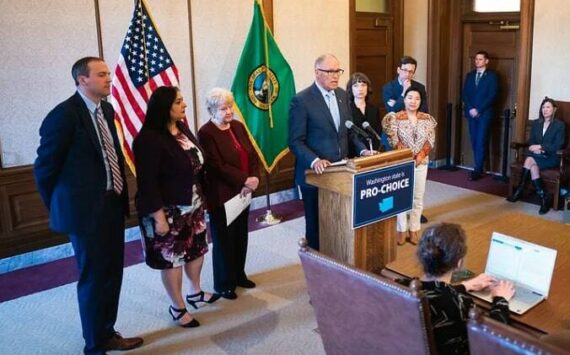OLYMPIA — Fix it or we’ll fix it for you.
That’s the message Sound Transit is hearing from incensed lawmakers who blame the use of an outdated formula setting vehicle values for driving up the cost of car tabs to help pay for a $54 billion expansion of light rail.
Lawmakers in both political parties want Sound Transit to ditch the 2-decade-old method that’s provided many car owners a stunning reality check on the amount of their contributions to the Sound Transit 3 expansion plan.
Legislators are demanding a swift response. Otherwise many stand ready to act on their own.
Already, a bill overhauling how the Sound Transit board of directors is chosen has cleared the Senate and is awaiting action in the House.
Monday morning, the Senate Transportation Committee has scheduled hearings on legislation to impose a new car tab calculating method and to allow cities and counties a way to get out of Sound Transit entirely.
“They’ve known this has been an issue for years,” Rep. Mark Harmsworth, R-Mill Creek, said last week. He serves on the House Transportation Committee and opposed ST3. “I believe the message is if you can show you’re responsible and you’re not politically deaf to the people of the state then these discussions we’re about to have won’t happen.”
Sound Transit Chief Executive Officer Peter Rogoff met with leaders of the House and Senate transportation committees in Olympia on Wednesday. The legislators summoned Rogoff to make him aware of the depth and breadth of consternation among their colleagues.
“It was a good airing of how people felt,” said Rep. Judy Clibborn, D-Mercer Island, who leads the House transportation panel.
“We heard a lot of concern about the methodology used for the collecting of the motor vehicle excise tax,” said Sound Transit spokesman Geoff Patrick. “Peter committed to take a very close review of what flexibility to make changes we have under state law and with our commitments to bond holders.”
Snohomish County Executive Dave Somers, who is the chairman of the Sound Transit Board of Directors, wasn’t at the meeting but has become acutely aware of the frustration.
“We’re trying to work with the Legislature to find a fix,” he said. “It’s going to take a partnership to get it done.”
Sound Transit 3 passed in November on the strength of support in Snohomish and King counties. Voters in Pierce County rejected it.
The plan calls for adding 62 miles of new Link light-rail line, including an extension to Everett Station by 2036, via the Paine Field industrial area. Other new light-rail destinations envisioned in ST3 include Tacoma, Ballard, West Seattle, downtown Redmond, south Kirkland and Issaquah.
To pay for the upgrades, the sales tax is going up half a percent within the district. There’s also a new property tax assessment of 25 cents for each $1,000 of assessed valuation. And car tab fees went from 0.3 percent to 1.1 percent which is adding the equivalent of $80 for every $10,000 vehicle to one’s bill.
The hike in the car tab fee took effect March 1. Some owners are opening their bills to find they must pay two or three times as much to Sound Transit as they did a year ago. They are calling the state Department of Licensing, Sound Transit and state lawmakers to complain.
“We’re definitely starting to see it,” said Sen. Guy Palumbo, D-Maltby. “The reality is that it is sticker shock and there may be some buyers remorse.”
Lawmakers are peeved because Sound Transit calculates its motor vehicle excise tax using a state-developed depreciation schedule drawn up in the 1990s in which the car’s value only dips 5 or 6 percent a year. After five years, for example, a car was considered to still be worth 75 percent of its original price.
The Department of Licensing updated its depreciation schedule in 2006. It shows a car loses 19 percent of its value after one year, 55 percent after five years.
But Sound Transit isn’t using the newer schedule for ST3. To pay off existing bonds, it assumed an amount of car tab collections tied to the older schedule, Patrick said. When those bonds are retired in 2028, Sound Transit is required by a 2015 law to switch to the newer depreciation schedule, he said.
Lawmakers want the switch to happen sooner. If it happens, it could mean less money comes in from car tabs than assumed at the time the ballot measure went before voters. Sound Transit is trying figure out how much less it might take in and if it would impact any ST3 projects, Patrick said.
“I want to hear what it is we can do without hurting the plan,” Clibborn said. “I don’t think we need a bill. I think they can do it voluntarily.”
Rep. Mike Sells, D-Everett, said a fix is needed but he doesn’t want to imperil extension of service to Everett.
“We need to be making sure we get that light rail through but on the other hand I want people to be treated fairly,” he said.
Sen. Steve O’Ban, R-University Place, one of those pressuring Sound Transit the most, said Friday a change can be made “that is fair, reasonable and will regain the trust of taxpayers and still get their schedule done.”
Accountability sought
O’Ban, a foe of ST3, also is leading the charge to shake up the transit agency organizational chart.
The Sound Transit board is made up of 17 local elected officials — 10 from King County, four from Pierce County and three from Snohomish County. The executive in each county makes the appointments. Snohomish County is represented by County Executive Somers, Everett Councilman Paul Roberts and Edmonds Mayor Dave Earling.
O’Ban’s bill, approved by the Senate, does away with the appointed board and replaces it with 11 independently elected directors. It passed 29-20 with five Democrats joining all Republicans in supporting the measure.
He said SB 5001, would give voice to a greater number of Sound Transit taxpayers and increase accountability of the agency’s day-to-day operations.
Palumbo, a first-year lawmaker, crossed the aisle to vote in support.
“I believe that any organization that manages $54 billion in tax dollars should be directly elected and accountable for that purpose,” he said. “For me, this is a good-government issue.”
Jerry Cornfield: 360-352-8623; jcornfield@heraldnet.com Twitter: @dospueblos.







